Members of the universities are concerned about impacts of the so-called “Act on Parttime Lecturers” ahead of implementing this law on August 1st. The original name of the revised act is the Amended Legislative Bill on Higher Education Act, which is designated to improve the status and treatment of part-time lecturers. Nevertheless, this act is so controversial that it has been delayed four times from 2012 to November 2018. It is closely related to part-time lecturers, universities, and also students. Accordingly, the Sungkyun Times (SKT) now looks over the present state of the Act on PartTime Lecturers, probable concerns regarding the act, and possible ways to improve.
The Present State of the Act on Part-time Lecturers
The Present State of Part-time Lecturers
First of all, part-time lecturers refer to temporary workers who get paid for delivering lectures for a fixed amount of time. According to the Association for Improving Institutions on Part-time Lecturers, which consists of parttime lecturers, and the National Assembly, there are about 7 million part-time lecturers in Korea. There are almost no part-time lecturers on the Natural Sciences Campus in Sungkyunkwan University and no lecturers have joined the Sungkyunkwan University branch of the Korea Temporary Professors Labor Union. This is because the natural science and engineering fields hire lab workers, which are different from part-time lecturers. In fact, according to research by Ministry of Education in 2017, the number of part-time lecturers in Humanities takes up about 44% of the entire number of lecturers, whereas the total part-time lecturers in Natural Science, Engineering, and Medicine take up about 30%.
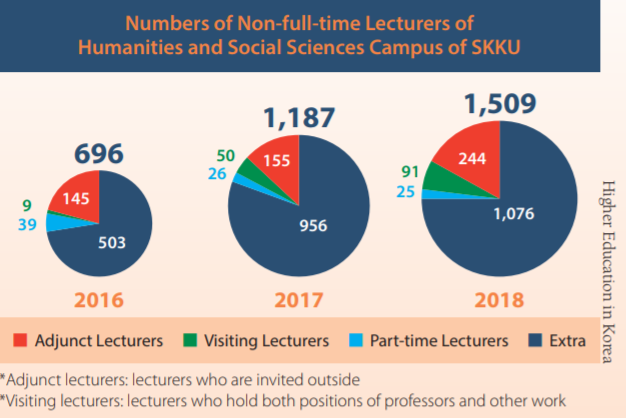
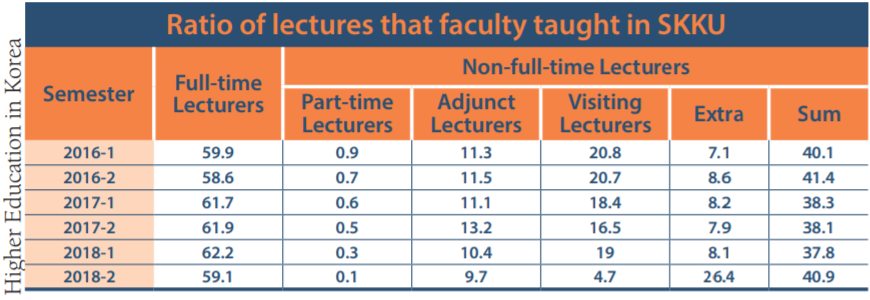
Changes in Government’s Policies on the Act on Part-time Lecturers
In 2003, a 34-year-old part-time lecturer at Seoul National University (SNU) killed himself because of economic hardships and instability of his unemployment. The Korean Irregular Professor Union (KIPU) then raised an appeal that urged the National Human Rights Commission to make substantive solutions for treating part-time lecturers better and improving lecturers’ status. The appeal brought up considerable attention from the public about the poor treatment that parttime lecturers were receiving from universities. In response, the National Human Rights Commission of Korea advised Ministry of Education, Science and Technology to improve the status of part-time lecturers, but no special progress has been made for six years. Then, Seo Jeong Min, a part-time instructor in the department of English and English Literature at Chosun University, committed suicide in May 2010 because of ghostwriting theses, corruption in the appointment of professors, and the unjust treatment of part-time lecturers. This led the Presidential Committee of Social Integration to announce an amendment to the systems of part-time workers in October 2010. After having passed the National Assembly, the amendment was delayed four times from December 2012 to December 2017, as universities and part-time lecturers were worried about its effects. After all of the agents’ efforts for two years, in February 2019, the Ministry of Education eventually preannounced that the amendment would be legislated and implemented starting from August 1st, 2019.
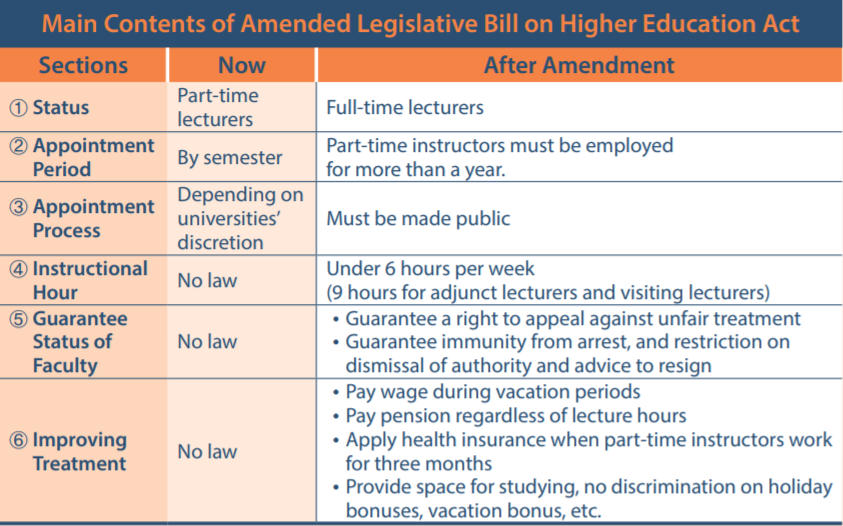
Probable Concerns Regarding the Act
Universities: Financial Burden
Universities in Korea need 296.5 billion won in total per year as additional budget after the ‘Act on Part-time Lecturers’ is implemented, according to an estimate by the Korean Council for University Education (KCUE). It means that each university has to manage billions of won. Many universities have difficulties embracing part-time instructors only with current government funds due to their unstable financial status. This is because tuition fees have been fixed for a decade and the number of students decreased. Following the act, universities have had to spend additional amounts for pensions, wages during vacations, and apply health insurances to parttime lecturers. To avoid this spending and other limits that universities will get by following the act, they are likely to hire faculty to avoid the act. The universities hire faculty staffs as adjunct lecturers or visiting lecturers, not part-time workers.
Part-time Instructors: Hard to Make a Living and Develop a Career
The number of parttime lecturers decreased from about 110,000 in 2011 to about 76,000 in 2017. The Association for Improving Institutions for Part-time Lecturers analyzed that this decline is because of the Act on Part-time Lecturers. Part-time instructors have trouble maintaining their status as some universities try to reduce the number of part-time lecturers and increase the number of adjunct or visiting professors. Also, young researchers can have restrictions on becoming professors by the amended act. Working as a part-time lecturer is a foothold for young researchers who have master’s degrees to become professors to make a living. Following the amended law, young researchers may have a huge disadvantage in building their careers because universities do not hire part-time lecturers. Though SKKU has not made certain movements in appointing and firing faculty because of the act yet, the SKKU branch of the KIPU, the Korean Graduate Employee Union, and the Committee of Professors for Democracy held a press conference at the school on December 13rd, 2018.
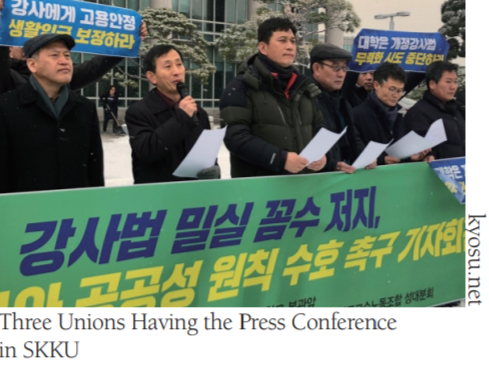
They were arguing that SKKU was discussing the way to follow the Act on Part-time Lecturers only via the Human Resources Team and it was trying to fire all part-time lecturers as it hires lecturers as adjunct and visiting lecturers instead of part-time lecturers.
Students: Violation of Their Right to Learn
As the Act on Part-time lecturers takes effect, students’ rights to learn can be violated and education can become poorer in quality. Several schools have reduced courses and compulsory credits for graduation whereas they have increased the number of large-enrollment courses and online courses. It seems that they are preparing for the reduction of the number of part-time instructors to save the additional spending. Korea University (KU) is a representative example that took such action. The student council of KU announced that the school cut down more than 200 courses in the first semester this year, compared to the first semester in 2018. As a result, the rights to learn of many students at KU has become seriously violated. Some students bought and sold the courses through the black market.
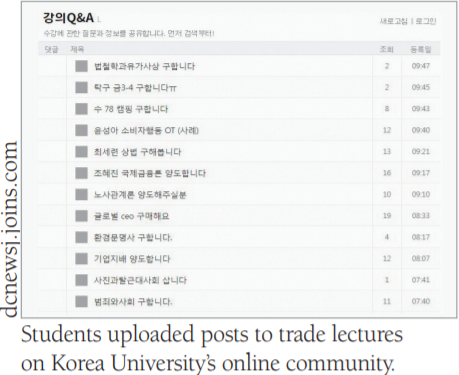
Moreover, some students took time off from the school after failing course registration. Also, universities increase the number of large enrollment courses and online courses in order to reduce the number of part-time lecturers. These kinds of courses, however, are not suitable for students to study, since students cannot ask questions to professors and have discussions in class. In addition, lecture hours for full-time lecturers can be increased, as the number of part-time lecturers is decreased. Then, fulltime lecturers could have less time to prepare for classes and study, which can compromise the quality of education.
Ways to Improve These Concerns
Discussion Between University Members
Regarding the Act on Part-time Lecturers, part-time lecturers, undergraduates, students, school, and full-time lecturers, are the main agents of the act. Although not many students might think that they are closely linked to the Act on Parttime Lecturers, the students are indeed one of the main agents. This act can consequentially impact on students with a low quality of education and violation of their rights for studying. Therefore, student councils of the universities should be prepared to act when students’ rights are violated. Also, all university members should discuss concerns and issues related to the act to find the best measure.
More Government Support
The Current Act on Part-time lecturers lays a financial burden on universities, while the government does not have specific countermeasures that secure the financial status of universities. The National Assembly arranged 28.8 billion won for the MOE to support the better treatment of part-time lecturers in December 2018. Lee Sang-eun, however, the leader of a research team on higher education at the KCUE, says that the support fund of the government is insufficient, which is only one-eighth of what universities should pay for parttime workers for vacations. Therefore, more funds are needed to aid universities for enforcing the act properly. Moreover, surveillance systems are necessary to protect part-time lecturers who have relatively weaker power than universities from unfair dismissals and watch and punish universities who hire or fire faculty unfairly to transgress the act.
Supplementing the Act
Though the act has been amended several times and will be enforced this August, universities and part-time workers are not fully satisfied with the final draft. Kim Jin-kyun, the head of the SKKU branch of KIPU, however, said that the working time of lecturers should include lecture times and the time they study and prepare for the lectures. The current act counts only for lecture time as working time so that lecturers are not able to apply for health insurance with six hours of lecture time a week. On the other hand, universities are concerned that the act will infringe on their autonomy. The act regulates the period of appointment, the working conditions, wages, and other specific details that universities must follow. These regulations on the school rules and appointment processes can be a violation of the autonomy of universities. The law should enact only a fundamental outline and respect the autonomy of universities.
The MOE, universities, part-time instructors, and students should discuss the Act on Part-time Lecturers to fulfill the original intention of this law to improve the status of part-time lecturers. The SKT hopes that problems or concerns on amending this act at universities, including SKKU, can be solved and make a better school that university members are happy with.
